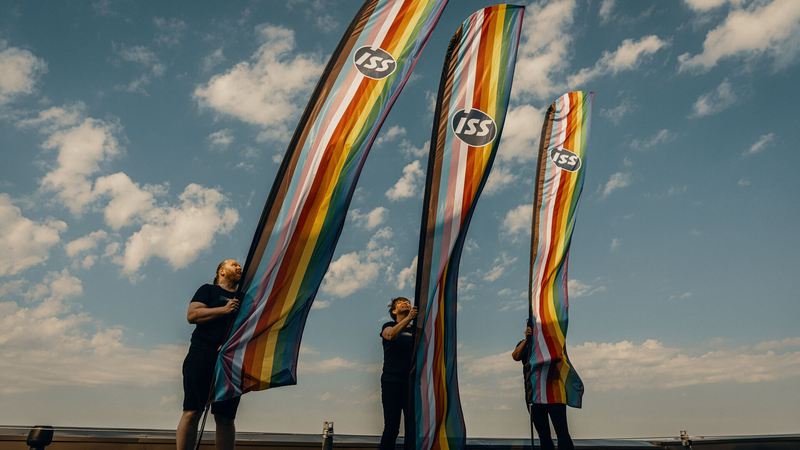As we celebrate the 2023 Pride season, Kat Parsons, Head of Diversity, Belonging & Inclusion at ISS UK & Ireland, shares her experience and discusses the challenges that face LGBTQIA+ people and families in the workplace — and why honest conversation is at the heart of the journey towards true equality.
As a long-time member of the Pride movement, I can’t help but notice how much of a curate’s egg the journey has been. 50 years of acceptance has seen the LGBTQIA+ community more openly presented and accepted, the current transgender rights movement doing for the 2020s what was once unthinkable in the 1990s.
Still, one look at what’s going on in our world, and it might feel like the needle might as well not have budged. We are still fighting for equal treatment under the law, still seeking to eliminate harmful mistruths and misconceptions — the good fight continues.
We have cause for optimism thanks to the more accepting members of society: those who know little about the LGBTQIA+ community but know, at least, that they welcome love in all forms. Yet the world often fails to account for lives outside traditional gender roles and sexualities, and as such, there are some specific struggles that go overlooked. This is our opportunity to educate, because so long as minds are opened, we can make our voices heard.
“Just asking questions”
Personally, I always welcome questions — I know that people are curious and that they want to educate themselves without the fear of judgement or saying the wrong thing. Yet many recurring questions also illustrate some lingering social biases — or at least, some innocent misunderstanding, even among allies.
For example, I know from experience that starting a family as a lesbian is very difficult. The decision on how to conceive a child is hard enough, but there are still the reactions on two women having a baby to contend with:
“But who is his mum? - Yes, but who had him?”
“Is it funny to say that he looks a bit like his non-biological parent?”
“How did you conceive, do you know the donor?”
These are actually very personal questions — and I’m happy to answer them because I know those asking are, generally, well-intentioned and simply want to be informed. But these are not the same questions one would ask of a heterosexual couple, and do speak to a lack of knowledge around gay or trans biology.
For those curious: we used a known sperm donor and were lucky enough to conceive two children. But when raising the issue of paternity leave at a previous company, the most ‘appropriate’ support they could offer was in the form of a paternity leave policy. This was far less forgivable, in my eyes — according to my then-employer, my family wouldn’t receive the same level of support as a heterosexual couple.
Suffering in silence
All that aside, it was the IVF which proved the most challenging financially, emotionally, and physically. The combination of tablets and daily injections, scans, appointments, tests and procedures over months take its toll. The increased hormones affected my working life, leaving me constantly tired, bloated, emotional and irrational. All this emotional and physical pain and upheaval, all with such a tiny chance of success.
Speaking about the topic is still considered taboo, but that’s an attitude in dire need of change when so much more support around the subject is needed. When you patiently count down the days and weeks until you can take a pregnancy test, only to find it negative...so swift, so blunt, so definite. After so much invested time, money and hope – with nothing but grief to show for it – there remains the full day of meetings to attend, with a brave smile on the face and a bitter disappointment lingering in the pit of your stomach. And that pain can be prevalent for weeks afterwards.
Research says that unsuccessful IVF attempts mirror the same pain felt from a bereavement, with increased anxiety, depression and stress, plus major detriments on self-esteem and confidence. For same sex couples, it’s hard enough to discuss the practicalities of IVF frankly and openly, so discussions around the emotional trauma are only more difficult to handle.
The road ahead
My story, of course, is only one colour on the LGBTQIA+ rainbow; when we consider how far same-sex marriages have come, one can only imagine the difficulties trans people encounter when discussions around hormone treatment, menstruation and fertility arise. Gender, as we know now, is fluid, non-binary — if science can prove the fluidity of gender, why shouldn’t medicine be able accommodate it?
It’s hard not to compare the efforts of today’s trans community to, say, the gay liberation movement of the 1980s. Arts and media are providing a voice. Activists are mobilising. Nevertheless, opposition continues from those with platforms who choose to share misinformation and sow division. With all members of the LGBTQIA+ community still combating ignorance (and apathy), history has taught us that frank, honest discussion is the key to opening hearts and minds to achieve real progress.
I’m proud to say that, at ISS, and with the backing of a wonderful Pride employee resource group (ERG), we’re committed in our determination not to hide from these conversations. For example, when we provide period products in male toilets, we’re not simply recognising the fluidity of gender. We’re making the discussion visible, reminding one another of our combined unity, and inviting ourselves to tackle the issues that affect us all (though period poverty is a discussion for a whole other blog!).
This month, ISS is celebrating its partnership with LGBTQIA+ charity Stonewall, making a bold and visible statement for Pride by closing the London Stock Exchange in the community’s honour. As that ceremonial bell rings aloud, I hope to not only ring out the day’s trading, but ring in a new era of understanding and equality.

